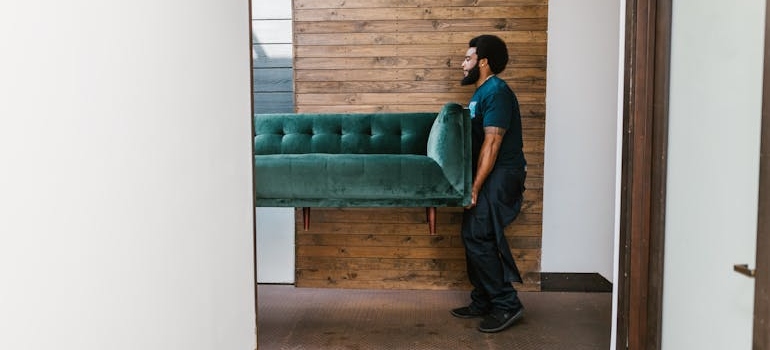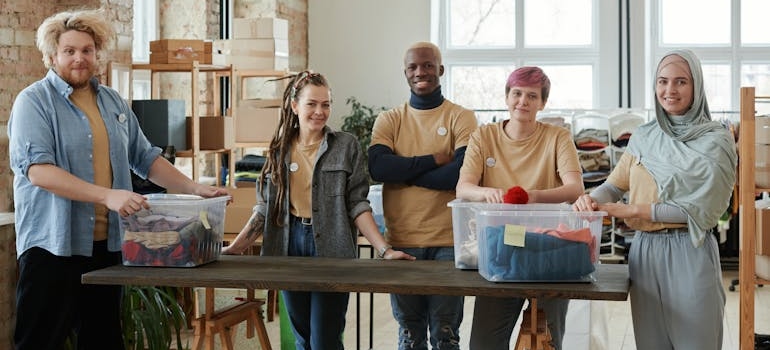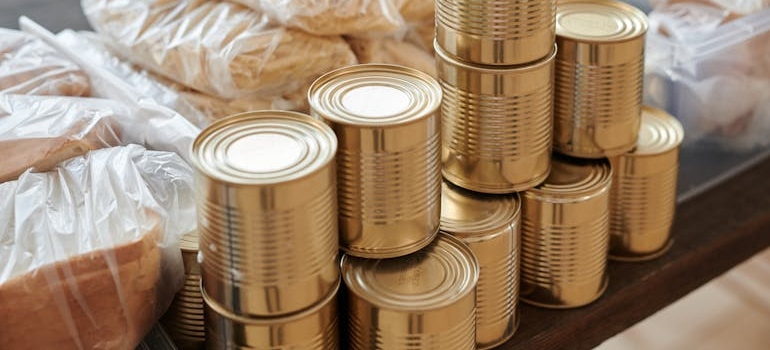Tips for Donating Unwanted Items When Moving
Moving is a prime opportunity to rethink what you own and make a fresh start, free from clutter. Instead of simply discarding items, donating allows you to reduce your load while supporting others in your community. For residents of Seattle and beyond, contributing gently used goods to local charities or causes helps both streamline your move and make a meaningful impact. If you coordinate donating unwanted items when moving with your chosen Seattle movers, you can often simplify the process, gain potential tax benefits, and reduce waste. So, follow these tailored tips to make the most of your move through thoughtful donations!
Conducting a Pre-Move Inventory for Efficient Decluttering
Before moving, a clear inventory is essential to identify items that no longer serve you and can be donated. The step does not just simplify your moving process but also ensures your donations will be both thoughtful and practical.
Prioritize Items by Usefulness and Condition
Sorting items into categories—such as clothes, kitchenware, books, furniture, and electronics—is a straightforward way to evaluate their usefulness. Focus on what you genuinely need in your new space and consider how other items might be valuable to others. Experienced local movers in Seattle often recommend clients start the sorting process early, which helps movers identify boxes for “donation” versus “keep.” Items like gently used clothing, small furniture, and usable electronics are particularly valuable to charities and individuals alike.
Create a Simple Tracking System for Donations
An organized system helps you keep track of what you plan to donate, where each item will go, and any related tax documentation. A spreadsheet or inventory app, such as Sortly, is ideal for listing donations, itemizing them by type, and noting their condition. Labeling boxes as “Donation” and “Keep” also simplifies logistics for movers, who can quickly identify items that need to be dropped off at charities.

Knowing What Can (and Can’t) Be Donated
Not everything is suitable for donation, and many organizations have specific guidelines regarding what they accept. Professional Washington movers often emphasize the importance of reducing excess weight for a more efficient, cost-effective move. Sorting items that meet donation standards—such as clothing, small appliances, and furniture—will facilitate your packing and make the process smoother for everyone involved.
Understanding Donation Guidelines and Regulations
Donation centers typically have regulations in place for health, safety, and logistical reasons. For example, furniture may need to be free of major stains or damage, and some appliances or electronics may not be accepted if outdated or broken. Reviewing each organization’s donation guidelines ensures you only donate items that meet these requirements. Here are some specifics on popular donation categories:
- Clothing: Donate gently used, in-season clothing that is freshly laundered. Organizations like Mary’s Place in Seattle specifically accept seasonal clothing for families in need.
- Electronics: Remove all personal data and confirm the functionality of any electronics before donating. Charities like InterConnection in Seattle specialize in refurbishing electronics to make them accessible to those who lack them.
- Furniture: Some donation centers only accept particular items or may have size limitations, so it’s wise to check before loading up the truck. Habitat for Humanity ReStores in Seattle accepts most large furniture and even provides a list of acceptable items online.
Seattle has a variety of local organizations that make it easy to donate items responsibly. Researching charities that align with your donation goals helps you find drop-off locations and clear guidelines on what’s needed most, making it simpler to plan ahead and maximize the impact of your contributions.
Recognizing When Disposal is the Better Option
Some items simply aren’t suitable for donation, and disposal is the more responsible option. For unusable or damaged items, look for eco-friendly disposal methods. In Seattle, recycling centers accept items like textiles, batteries, or electronics that can’t be reused, for an environmentally conscious approach.
Choosing the Right Organizations for Donation
Selecting the right place to donate ensures your items go to those who can use them most. Many Seattle organizations have specific needs, which can help you decide where to donate based on item type and potential impact.
Research Local Charities and Non-Profits
Seattle-based charities and non-profits often rely on donations to meet community needs, and supporting these organizations can provide direct assistance within the city. Begin by researching organizations in your area and verifying their needs. Platforms like Charity Navigator or GuideStar offer ratings on financial transparency and effectiveness, allowing you to make informed decisions.
Consider Specialty Charities for Unique Items
Specialty organizations can sometimes make better use of specific items than general charities. Here are a few options to consider when donating unwanted items when moving:
- Books: Libraries or literacy programs are ideal for donating books, as they help increase accessibility to educational materials.
- Eyeglasses: Programs like Lions Clubs International accept eyeglasses for distribution to those in need of vision assistance.
- Furniture: Habitat for Humanity’s ReStores in Seattle accept most types of furniture, and their proceeds go toward housing initiatives.
Specialty charities make sure donated items are put to their best use and reach those who need them most. Many well-established organizations in Seattle focus on specific types of donations, from books and electronics to furniture, helping you ensure that your items are truly valued and utilized.
Besides, organizations like Goodwill and Salvation Army offer pick-up services for larger donations, which is especially convenient when moving. Contact these organizations in advance to arrange pick-up times, as they are often in high demand.

Maximize Convenience with Online Donation and Pickup Services
Technology has made donating easier than ever. From mobile apps to national pick-up services, a variety of platforms now offer convenient ways to donate, often directly from your home. With fewer items to load, your relocation with moving services in Seattle becomes more efficient, and you’ll have the peace of mind that these items will find new homes in your area.
Use Donation Apps and Websites
Online platforms like OfferUp, Nextdoor, and Facebook Marketplace offer easy ways to connect with local individuals or charities that can benefit from your items. Solely by listing items on these platforms, you can find neighbors or community members in need who may want them directly. Apps like Freecycle and Buy Nothing Seattle are community-driven platforms where you can post items for pick-up without needing a formal donation center.
Leverage National Pickup Services for Specific Needs
Services like GreenDrop, Pickup Please, and AMVETS partner with charities and offer scheduled donation pick-ups for those with limited transport options. Scheduling a pick-up allows donating unwanted items when moving directly from your home, saving you the trip to a donation center.
Donating Items Responsibly and Respectfully
A responsible approach to donating shows respect for both the charity and the recipients who will ultimately use the items. Preparing items properly also increases their likelihood of being accepted and reused.
Clean and Prepare Items for Donation
Cleaning and organizing items before donating not only makes them more appealing but also shows respect for the recipient. For example, wash and fold clothing, wipe down surfaces of furniture, and properly package fragile items. Donation centers in Seattle appreciate when items are in ready-to-use condition, as it reduces sorting time and enables quicker distribution to those in need.
Avoid Overwhelming Smaller Organizations with Large Donations
When donating in bulk or giving away a high volume of items, it’s best to call ahead and coordinate with smaller charities. Smaller organizations may have limited storage, and overloading them can create challenges. You can arrange donations that fit the charity’s specific needs by coordinating. Professional movers in Seattle can assist in transporting these donations directly, minimizing any logistical burden.

Understand the Tax Benefits and Legalities of Donations
For those managing a long-distance or complex relocation, knowing the tax benefits of donating unwanted items when moving can make a substantial difference. Reducing non-essential items before a move can lead to both financial and logistical advantages. As you work with long-distance movers in Seattle to determine what to pack and what to leave behind, keep a record of donated items. Appropriate documentation ensures you can claim eligible deductions, adding value to the process and helping offset some moving expenses.
Keep Records for Tax Deductions
For tax purposes, keep receipts and maintain accurate records of all donations, noting each item’s estimated value and condition. The IRS requires specific documentation for items valued over $500 (IRS Form 8283). For larger moves, many moving companies will provide receipts or documentation, helping you stay organized.
Know What Can Be Deducted and What Cannot
Not every donation qualifies for a tax deduction, so review IRS guidelines or consult a tax professional. Clothing, household items, and some appliances may qualify if in “good” condition, but limitations apply. For estimating the value of donated items, the Salvation Army’s Valuation Guide or IRS publications offer useful guidelines. Proper valuation protects both donors and charities and ensures compliance with tax regulations.
Donating Food During a Move
Moving is a prime time to reevaluate pantry items. Perishable and non-perishable foods can be cumbersome to transport, and many foods end up discarded during the moving process. Instead, consider donating items to local food banks, shelters, or programs that provide meals to those in need.
In Seattle, the demand for food donations is high due to rising living costs, making it easy to contribute in a significant way. When collaborating with food-focused organizations or donation programs through your moving company, you can avoid food waste and support your community’s most vulnerable.
Assessing Your Pantry for Donation-Friendly Items
Start by going through your pantry a few weeks before moving. Non-perishable items, such as canned goods, dried pasta, rice, and cereals, are ideal for donation. Be sure to check expiration dates and set aside any items that are close to expiring but still within usable dates. Before donating unwanted items when moving, keep in mind that some food banks have specific needs, so consider calling ahead to see which items are most useful.

Partnering with Local Food Banks or Charities
Seattle’s network of food banks and community programs depends on consistent food donations to keep pantries stocked. For example, programs like Food Lifeline and the Ballard Food Bank accept non-perishable donations to provide meals to families across the city.
Many of these organizations post specific needs on their websites, including culturally relevant foods that resonate with Seattle’s diverse population. If your movers offer food donation services or partner with local food banks, consider coordinating with them to ensure your donation reaches these organizations effectively.
Furthermore, Move for Hunger is a nonprofit organization that partners with moving companies to facilitate non-perishable food donations during moves. Participating movers collect unwanted pantry items from clients and deliver them to local food banks, providing an easy and impactful way to donate. Simply ask your moving company if they participate, and set aside pantry items for them to collect. Through initiatives like this, your move can contribute to an ongoing effort to reduce hunger nationwide.
Making a Positive Impact Through Thoughtful Donations
Each item—whether it’s a warm coat, a sturdy table, or an extra set of dishes—can meet an immediate need for someone else. Donating during a relocation goes beyond lightening your load; it creates a tangible ripple of support across your community. When these contributions go to local charities, shelters, or specialty organizations, they directly strengthen Seattle’s communities, ensuring that valuable resources reach people who will truly use and appreciate them.
With each box you set aside for donation, you’re making a conscious decision to prioritize reuse over waste and to connect meaningfully with your city’s network of support services. Coordinating with your moving company to facilitate these donations—or organizing them on your own—turns a routine move into a meaningful opportunity to benefit both your household and the community. Donating unwanted items when moving can transform the entire experience, making your transition to a new home an act of connection and care.
Why Choose Us
History
Hansen Bros. Moving & Storage is locally owned and operated by the same family for four generations, since 1890. We have a well-established reputation for service quality and reliability with a high percentage of repeat household and commercial clients.
Professionalism
We’re a certified ProMover by the American Moving and Storage Association with A+ rating with the Better Business Bureau, voted “Best in Western Washington” in 2009 and from 2011 to 2016 by KING5. Our company is fully licensed and insured and member of WMC and AMSA.
Value
Hansen Bros. Moving & Storage provide free, no-obligation in-home estimate and competitive rates, including low minimum rates for shipments moving under 300 miles. We’ve set a refund policy for unused packing materials and three Puget Sound locations to help clients save on travel fee costs.



